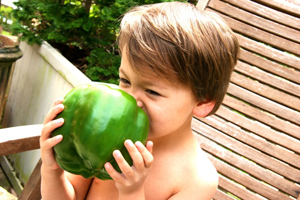By Karen Sherwood
In a land of go-gurts, happy meals, lunchables, and clever junk food marketing geared toward kids, raising a healthy child is becoming increasingly difficult. We are never more than five feet away from a food message and 90% of those messages are not about health food. So what’s a parent to do? KISS (Keep it Super Simple) those problems away! Here are four super simple tips to keep your child healthy while maintaining your sanity.
1. Lead by example – How can we ever expect our children to grow up healthy if we are setting examples that are far from it? According to the Centers for Disease Control and Prevention, obesity is the result of more than just genetics, but a culmination of behavioral and environmental factors. Like it or not, until their 18 years old (sometimes even longer), parents are responsible for setting a healthy environment for their children. Needless to say, it does a child no good when they’re receiving orders to eat more broccoli while their parent is lying on the couch with a bag of potato chips and a diet soda.
Jill Fabri, RD and mother of three, agrees. “The most important thing I ever did for my kids was not to TELL them that a healthy lifestyle is exciting, but to SHOW them. Every morning, they see me making healthy protein shakes, preparing my lunch for work ahead of time, and fitting in some form of exercise every day.” It’s obviously impossible to be with your kids every second, but parents sometimes don’t realize just how much their own actions affect their children.
2. Let loose once in a while – Though it’s a good idea to monitor what the kids are eating, sometimes parents go overboard and restrict their children from eating anything “fun,” which can get pretty dangerous. Kids are smart cookies, and though you may be doing your best to pack their lunches with the healthiest morsels you can find, they’re still watching what their friends are eating, and often times, partaking in some lunch-room mischief of their own. If we’re too restricted at home, kids will begin to look at school, or friend’s houses to be their “junk-food fantasy land” where they let loose and eat whatever they want. Moderation at home is your best bet, i.e. plenty of veggies, fruits, and lean proteins, and the occasional “fun” splurge.
3. Reward with love, not food – Does your child get an A on his/her report card and receive a piece of candy for a job well done? Or have you ever said, “eat one bite of broccoli and you will get dessert?” These indulgences are certainly okay once in a while, but when desserts and other treats are given to children as a reward it sends a message that food is a reward for good behavior. Studies have shown that people who were rewarded with food in their youth grow up to have strained relationships with food, including emotional eating behaviors, satiety confusion, and difficulty losing weight.
4. Get smart about fake foods – Beware of “healthy-looking” foods marketed for children. Just because a box has a picture of a fruit on it does NOT mean it’s healthy. Kid’s cereals are among the worst. The EWG (Environmental Working Group) quoted NYU nutrition professor Marion Nestle as saying, “Cereal companies have spent fortunes on convincing parents that a kid’s breakfast means cereal, and that sugary cereals are fun, benign, and all kids will eat. The cereals on the EWG highest-sugar list are among the most profitable for their makers, who back up their investment with advertising budgets of $20 million a year or more. They should be eating real food.” There are healthier things kids could be eating for breakfast, i.e.- eggs, toast with peanut or almond butter, fresh fruit smoothies, or yogurt and granola.
Sources for this article include:
http://www.cdc.gov/healthyyouth/obesity/facts.htm
http://www.diabetes.org/diabetes-basics/diabetes-statistics/
http://www.cbsnews.com/8301-500165_162-57338283/study-ranks-10-worst-kids-cereals-for-sugar/
